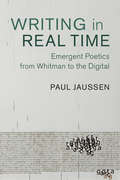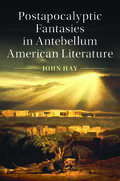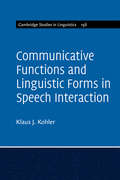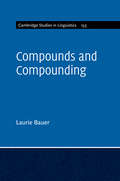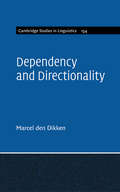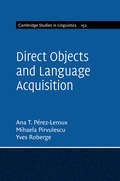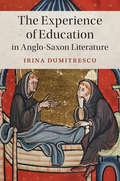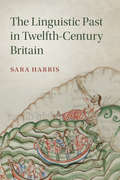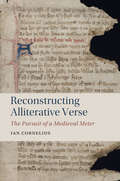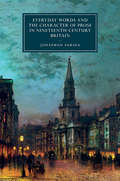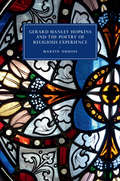- Table View
- List View
Cambridge Studies in American Literature and Culture: Emergent Poetics from Whitman to the Digital (Cambridge Studies in American Literature and Culture #163)
by Paul JaussenFrom Walt Whitman to the contemporary period, the long poem has been one of the more dynamic, intricate, and yet challenging literary practices of modernity. Addressing those challenges, Writing in Real Time combines systems theory, literary history, and recent debates in poetics to interpret a broad range of American long poems as emergent systems, capable of adaptation and transformation in response to environmental change. Due to these emergent properties, the long poem performs essential cultural work, offering a unique experience of history that remains valuable for our rapidly transforming digital age. Moving across a broad range of literary and theoretical texts, Writing in Real Time demonstrates that the study of emergence can enhance literary scholarship, just as literature provides unique insights into emergent properties, making this book a key resource for scholars, graduate students, and undergraduate students alike.
Cambridge Studies in American Literature and Culture: Fictions of Mass Democracy in Nineteenth-Century America
by Stacey MargolisFictions of Mass Democracy in Nineteenth-Century America examines how mass democracy was understood before public opinion could be measured by polls. It argues that fiction, in its freedom to represent what resists representation, develops the most groundbreaking theories of the democratic public. These literary accounts of democracy focus less on overt pubic action than the profound effects of everyday social encounters. This book thus departs from recent scholarship, which emphasizes the responsibilities of citizenship and the achievements of oppositional social movements. It demonstrates how novels and stories by Charles Brockden Brown, Edgar Allan Poe, Nathaniel Hawthorne, Herman Melville, Fanny Fern, Harriet Jacobs and James Fenimore Cooper attempt to understand a public organized not only by explicitly political discourse, but by informal and disorganized social networks.
Cambridge Studies in American Literature and Culture: Hobbes, Sovereignty, and Early American Literature
by Paul DownesHobbes, Sovereignty, and Early American Literature pursues the question of democratic sovereignty as it was anticipated, theorized and resisted in the American colonies and in the early United States. It proposes that orthodox American liberal accounts of political community need to be supplemented and challenged by the deeply controversial theory of sovereignty that was articulated in Thomas Hobbes's Leviathan (1651). This book offers a radical re-evaluation of Hobbes's political theory and demonstrates how a renewed attention to key Hobbesian ideas might inform inventive re-readings of major American literary, religious and political texts. Ranging from seventeenth- and eighteenth-century Puritan attempts to theorize God's sovereignty to revolutionary and founding-era debates over popular sovereignty, this book argues that democratic aspiration still has much to learn from Hobbes's Leviathan and from the powerful liberal resistance it has repeatedly provoked.
Cambridge Studies in American Literature and Culture: Nineteenth-Century American Literature and the Long Civil War
by Cody MarrsAmerican literature in the nineteenth century is often divided into two asymmetrical halves, neatly separated by the Civil War. In Nineteenth-Century American Literature and the Long Civil War, Cody Marrs argues that the war is a far more elastic boundary for literary history than has frequently been assumed. Focusing on the later writings of Walt Whitman, Frederick Douglass, Herman Melville, and Emily Dickinson, this book shows how the war took imaginative shape across, and even beyond, the nineteenth century, inflecting literary forms and expressions for decades after 1865. These writers, Marrs demonstrates, are best understood not as antebellum or postbellum figures but as transbellum authors who cipher their later experiences through their wartime impressions and prewar ideals. This book is a bold, revisionary contribution to debates about temporality, periodization, and the shape of American literary history.
Cambridge Studies in American Literature and Culture: Postapocalyptic Fantasies in Antebellum American Literature (Cambridge Studies in American Literature and Culture #164)
by John HayEven before the Civil War, American writers were imagining life after a massive global catastrophe. For many, the blank slate of the American continent was instead a wreckage-strewn wasteland, a new world in ruins. Bringing together epic and lyric poems, fictional tales, travel narratives, and scientific texts, Postapocalyptic Fantasies in Antebellum American Literature reveals that US authors who enthusiastically celebrated the myths of primeval wilderness and virgin land also frequently resorted to speculations about the annihilation of civilizations, past and future. By examining such postapocalyptic fantasies, this study recovers an antebellum rhetoric untethered to claims for historical exceptionalism - a patriotic rhetoric that celebrates America while denying the United States a unique position outside of world history. As the scientific field of natural history produced new theories regarding biological extinction, geological transformation, and environmental collapse, American writers responded with wild visions of the ancient past and the distant future.
Cambridge Studies in American Literature and Culture: The Poetry of Disturbance
by David BergmanIn The Poetry of Disturbance, David Bergman argues that post-war poetry underwent a significant if subtle shift in emphasis, moving from the modernist concern with the poem as a visual text to one that was chiefly oral in nature. The resulting change was disturbing, especially for those brought up on the principles of high modernism. This new stress on orality implied a shift in the economy of the poem, away from the austerity of language advocated by Pound and Eliot to a style that conveyed freedom, expansiveness, and an innovative directness.
Cambridge Studies in American Literature and Culture: Time, Tense, and American Literature
by Cindy WeinsteinIn Time, Tense, and American Literature, Cindy Weinstein examines canonical American authors who employ a range of tenses to tell a story that has already taken place. This book argues that key texts in the archive of American literature are inconsistent in their retrospective status, ricocheting between past, present and future. Taking 'The Narrative of Arthur Gordon Pym' as her point of departure, Weinstein shows how Poe's way of representing time involves careening tenses, missing chronometers and inoperable watches, thus establishing a vocabulary of time that is at once anticipated in the fiction of Charles Brockden Brown and further articulated in works by Elizabeth Stuart Phelps, Theodore Dreiser and Edward P. Jones. Each chapter examines the often strange narrative fabric of these novels and presents an opportunity to understand how especially complicated historical moments, from the founding of the new nation to the psychic consequences of the Civil War, find contextual expression through a literary uncertainty about time.
Cambridge Studies in Linguistics: Communicative Functions and Linguistic Forms in Speech Interaction
by Kohler Klaus J.Prosody is generally studied at a separate linguistic level from syntax and semantics. It analyses phonetic properties of utterances such as pitch and prominence, and orders them into phonological categories such as pitch accent, boundary tone, and metrical grid. The goal is to define distinctive formal differentiators of meanings in utterances. But what these meanings are is either excluded or a secondary concern. This book takes the opposite approach, asking what are the basic categories of meaning that speakers want to transmit to listeners? And what formal means do they use to achieve it? It places linguistic form in functions of speech communication, and takes into account all the formal exponents - sounds, words, syntax, prosodies - for specific functional coding. Basic communicative functions such as 'questioning' may be universally assumed, but their coding by linguistic bundles varies between languages. A comparison of function-form systems in English, German and Mandarin Chinese shows this formal diversity for universal functions.
Cambridge Studies in Linguistics: Compounds and Compounding (Cambridge Studies in Linguistics #155)
by Laurie BauerAre compounds words or phrases - or are they neither or both? How should we classify compounds? How can we deal with the fact that the relationship between the elements of sugar pill ('pill made of sugar') is different from that in sea-sickness pill ('pill to prevent sea-sickness')? Are compounds a linguistic universal? How much do languages vary in the way their compounds work? Why do we need compounds, when there are other ways of creating the same meanings? Are so-called neoclassical compounds like photograph really compounds? Based on more than forty years' research, this controversial new book sets out to answer these and many other questions.
Cambridge Studies in Linguistics: Dependency and Directionality (Cambridge Studies In Linguistics #154)
by Den Dikken MarcelThe direction in which the structure of sentences and filler-gap dependencies are built is a topic of fundamental importance to linguistic theory and its applications. This book develops an integrated understanding of structure building, movement and locality embedded in a syntactic theory that argues for a 'top down' approach, presenting an explicit counterweight to the bottom-up derivations pervading the Chomskian mainstream. It combines a compact and comprehensive historical perspective on structure building, the cycle, and movement, with detailed discussions of island effects, the typology of long-distance filler-gap dependencies, and the special problems posed by the subject in clausal syntax. Providing introductions to the main issues, reviewing extant arguments for bottom-up and top-down approaches, and presenting several case studies in its development of a new theory, this book should be of interest to all students and scholars of language interested in syntactic structures and the dependencies inside them.
Cambridge Studies in Linguistics: Direct Objects and Language Acquisition (Cambridge Studies in Linguistics #152)
by Pérez-Leroux Ana T. Mihaela Pirvulescu Yves RobergeDirect object omission is a general occurrence, observed in varying degrees across the world's languages. The expression of verbal transitivity in small children begins with the regular use of verbs without their object, even where object omissions are illicit in the ambient language. Grounded in generative grammar and learnability theory, this book presents a comprehensive view of experimental approaches to object acquisition, and is the first to examine how children rely on the lexical, structural and pragmatic components to unravel the system. The results presented lead to the hypothesis that missing objects in child language should not be seen as a deficit but as a continuous process of knowledge integration. The book argues for a new model of how this aspect of grammar is innately represented from birth. Ideal reading for advanced students and researchers in language acquisition and syntactic theory, the book's opening and closing chapters are also suitable for non-specialist readers.
Cambridge Studies in Linguistics: Inflectional Defectiveness
by Andrea D. SimsParadigmatic gaps ('missing' inflected forms) have traditionally been considered to be the random detritus of a language's history and marginal exceptions to the normal functioning of its inflectional system. Arguing that this is a misperception, Inflectional Defectiveness demonstrates that paradigmatic gaps are in fact normal and expected products of inflectional structure. Sims offers an accessible exploration of how and why inflectional defectiveness arises, why it persists, and how it is learned. The book presents a theory of morphology which is rooted in the implicative structure of the paradigm. This systematic exploration of the topic also addresses questions of inflection class organization, the morphology-syntax interface, the structure of the lexicon, and the nature of productivity. Presenting a novel synthesis of established research and new empirical data, this work is significant for researchers and graduate students in all fields of linguistics.
Cambridge Studies in Linguistics: Inflectional Paradigms
by Gregory StumpA new contribution to linguistic theory, this book presents a formal framework for the analysis of word structure in human language. It sets forth the network of hypotheses constituting Paradigm Function Morphology, a theory of inflectional form whose central insight is that paradigms play an essential role in the definition of a language's system of word structure. The theory comprises several unprecedented claims, chief among which is the claim that a language's realization rules serve as clauses in the definition of a paradigm function, an overarching construct which is indispensable for capturing certain kinds of generalizations about inflectional form. This book differs from other recent works on the same subject in that it treats inflectional morphology as an autonomous system of principles rather than as a subsystem of syntax or phonology and it draws upon evidence from a diverse range of languages in motivating the proposed conception of word structure.
Cambridge Studies in Linguistics: The Phonology of Consonants
by Wm. G. BennettThe most comprehensive work on dissimilation (the avoidance or repair of combinations of similar sounds) to date, this book proposes a novel analysis that handles dissimilation as the avoidance of surface correspondence relationships. It draws on recent work in Agreement By Correspondence to show that dissimilation is a natural outcome predicted by the same theory of Surface Correspondence. The theory is developed in more detail than ever before, and its predictions are tested and evaluated through ten in-depth analyses of diverse languages from Quechua to Kinyarwanda, together with a typological survey of over 150 dissimilation patterns drawn from over 130 languages, from Acehnese to Zulu. The book redefines the core of Surface Correspondence theory to a level of formal specificity and theoretical precision surpassing previous work. The book's findings are made more accessible by numerous examples featuring data from 47 languages from around the world.
Cambridge Studies in Medieval Literature: Imagining Medieval English
by Tim William MachanImagining Medieval English is concerned with how we think about language, and simply through the process of thinking about it, give substance to an array of phenomena, including grammar, usage, variation, change, regional dialects, sociolects, registers, periodization, and even language itself. Leading scholars in the field explore conventional conceptualisations of medieval English, and consider possible alternatives and their implications for cultural as well as linguistic history. They explore not only the language's structural traits, but also the sociolinguistic and theoretical expectations that frame them and make them real. Spanning the period from 500 to 1500 and drawing on a wide range of examples, the chapters discuss topics such as medieval multilingualism, colloquial medieval English, standard and regional varieties, and the post-medieval reception of Old and Middle English. Together, they argue that what medieval English is, depends, in part, on who's looking at it, how, when and why.
Cambridge Studies in Medieval Literature: The Evolution of Verse Structure in Old and Middle English Poetry
by Geoffrey RussomIn this fascinating study, Geoffrey Russom traces the evolution of the major English poetic traditions by reference to the evolution of the English language, and considers how verse forms are born, how they evolve, and why they die. Using a general theory of poetic form employing universal principles rooted in the human language faculty, Russom argues that certain kinds of poetry tend to arise spontaneously in languages with identifiable characteristics. Language changes may require modification of metrical rules and may eventually lead to extinction of a meter. Russom's theory is applied to explain the development of English meters from the earliest alliterative poems in Old and Middle English and the transition to iambic meter in the Modern English period. This thorough yet accessible study provides detailed analyses of form in key poems, including Beowulf and Sir Gawain and the Green Knight, and a glossary of technical terms.
Cambridge Studies in Medieval Literature: The Experience of Education in Anglo-Saxon Literature (Cambridge Studies in Medieval Literature #102)
by Irina DumitrescuAnglo-Saxons valued education yet understood how precarious it could be, alternately bolstered and undermined by fear, desire, and memory. They praised their teachers in official writing, but composed and translated scenes of instruction that revealed the emotional and cognitive complexity of learning. Irina Dumitrescu explores how early medieval writers used fictional representations of education to explore the relationship between teacher and student. These texts hint at the challenges of teaching and learning: curiosity, pride, forgetfulness, inattention, and despair. Still, these difficulties are understood to be part of the dynamic process of pedagogy, not simply a sign of its failure. The book demonstrates the enduring concern of Anglo-Saxon authors with learning throughout Old English and Latin poems, hagiographies, histories, and schoolbooks.
Cambridge Studies in Medieval Literature: The Linguistic Past in Twelfth-Century Britain (Cambridge Studies in Medieval Literature #100)
by Sara HarrisHow was the complex history of Britain's languages understood by twelfth-century authors? This book argues that the social, political and linguistic upheavals that occurred in the wake of the Norman Conquest intensified later interest in the historicity of languages. An atmosphere of enquiry fostered vernacular literature's prestige and led to a newfound sense of how ancient languages could be used to convey historical claims. The vernacular hence became an important site for the construction and memorialisation of dynastic, institutional and ethnic identities. This study demonstrates the breadth of interest in the linguistic past across different social groups and the striking variety of genre used to depict it, including romance, legal translation, history, poetry and hagiography. Through a series of detailed case studies, Sara Harris shows how specific works represent key aspects of the period's imaginative engagement with English, Brittonic, Latin and French language development.
Cambridge Studies in Medieval Literature: The Medieval Manuscript Book
by Michael JohnstonTraditional scholarship on manuscripts has tended to focus on issues concerning their production and has shown comparatively little interest in the cultural contexts of the manuscript book. The Medieval Manuscript Book redresses this by focusing on aspects of the medieval book in its cultural situations. Written by experts in the study of the handmade book before print, this volume combines bibliographical expertise with broader insights into the theory and praxis of manuscript study in areas from bibliography to social context, linguistics to location, and archaeology to conservation. The focus of the contributions ranges widely, from authorship to miscellaneity, and from vernacularity to digital facsimiles of manuscripts. Taken as a whole, these essays make the case that to understand the manuscript book it must be analyzed in all its cultural complexity, from production to transmission to its continued adaptation.
Cambridge Studies in Medieval Literature: The Pursuit of a Medieval Meter (Cambridge Studies in Medieval Literature #99)
by Ian CorneliusThe poetry we call 'alliterative' is recorded in English from the seventh century until the sixteenth, and includes Caedmon's 'Hymn', Beowulf, Sir Gawain and the Green Knight, and Piers Plowman. These are some of the most admired works of medieval English literature, and also among the most enigmatic. The formal practice of alliterative poets exceeded the conceptual grasp of medieval literary theory; theorists are still playing catch-up today. This book explains the distinctive nature of alliterative meter, explores its differences from subsequent accentual-syllabic forms, and advances a reformed understanding of medieval English literary history. The startling formal variety of Piers Plowman and other Middle English alliterative poems comes into sharper focus when viewed in diachronic perspective: the meter was in transition; to understand it, we need to know where it came from and where it was headed at the moment it died out.
Cambridge Studies in Modern Theatre: A History of the Berliner Ensemble
by David BarnettThe Berliner Ensemble was founded by Bertolt Brecht and his wife Helene Weigel in 1949. The company soon gained international prominence, and its productions and philosophy influenced the work of theatre-makers around the world. David Barnett's book is the first study of the company in any language. Based on extensive archival research, it uncovers Brecht's working methods and those of the company's most important directors after his death. The book considers the boon and burden of Brecht's legacy and provides new insights into battles waged behind the scenes for the preservation of the Brechtian tradition. The Berliner Ensemble was also the German Democratic Republic's most prestigious cultural export, attracting attention from the highest circles of government, and from the Stasi, before it privatised itself after German reunification in 1990. Barnett pieces together a complex history that sheds light on both the company's groundbreaking productions and their turbulent times.
Cambridge Studies in Nineteenth-Century Literature and Culture: Dickens and The Business of Death
by Claire WoodCharles Dickens is famous for his deathbed scenes, but these have rarely been examined within the context of his ambivalence towards the Victorian commodification of death. Dickens repeatedly criticised ostentatious funeral and mourning customs, and asserted the harmful consequences of treating the corpse as an object of speculation rather than sympathy. At the same time, he was fascinated by those who made a living from death and recognised that his authorial profits implicated him in the same trade. This book explores how Dickens turned mortality into the stuff of life and art as he navigated a thriving culture of death-based consumption. It surveys the diverse ways in which death became a business, from body-snatching, undertaking, and joint-stock cemetery companies, to the telling and selling of stories. This broad study offers fresh perspectives on death in The Old Curiosity Shop and Our Mutual Friend, and discusses lesser-known works and textual illustrations.
Cambridge Studies in Nineteenth-Century Literature and Culture: English Fiction and the Evolution of Language, 1850–1914
by Will AbberleyVictorian science changed language from a tool into a natural phenomenon, evolving independently of its speakers. Will Abberley explores how science and fiction interacted in imagining different stories of language evolution. Popular narratives of language progress clashed with others of decay and degeneration. Furthermore, the blurring of language evolution with biological evolution encouraged Victorians to re-imagine language as a mixture of social convention and primordial instinct. Abberley argues that fiction by authors such as Charles Kingsley, Thomas Hardy and H. G. Wells not only reflected these intellectual currents, but also helped to shape them. Genres from utopia to historical romance supplied narrative models for generating thought experiments in the possible pasts and futures of language. Equally, fiction that explored the instinctive roots of language intervened in debates about language standardisation and scientific objectivity. These textual readings offer new perspectives on twenty-first-century discussions about language evolution and the language of science.
Cambridge Studies in Nineteenth-Century Literature and Culture: Everyday Words and the Character of Prose in Nineteenth-Century Britain (Cambridge Studies in Nineteenth-Century Literature and Culture #107)
by Jonathan FarinaEveryday Words is an original and innovative study of the stylistic tics of canonical novelists including Austen, Dickens, Trollope, Thackeray and Eliot. Jonathan Farina shows how ordinary locutions such as 'a decided turn', 'as if' and 'that sort of thing' condense nineteenth-century manners, tacit aesthetics and assumptions about what counts as knowledge. Writers recognized these recurrent 'everyday words' as signatures of 'character'. Attending to them reveals how many of the fundamental forms of characterizing fictional characters also turn out to be forms of characterizing objects, natural phenomena and inanimate, abstract things, such as physical laws, the economy and legal practice. Ultimately, this book revises what 'character' meant to nineteenth-century Britons by respecting the overlapping, transdisciplinary connotations of the category.
Cambridge Studies in Nineteenth-Century Literature and Culture: Gerard Manley Hopkins and the Poetry of Religious Experience (Cambridge Studies in Nineteenth-Century Literature and Culture #108)
by Martin DuboisThis nuanced yet accessible study is the first to examine the range of religious experience imagined in Hopkins's writing. By exploring the shifting way in which Hopkins imagines religious belief in individual history, Martin Dubois contests established views of his poetry as a unified project. Combining detailed close readings with extensive historical research, Dubois argues that the spiritual awareness manifest in Hopkins's poetry is varied and fluctuating, and that this is less a failure of his intellectual system than a sign of the experiential character of much of his poetry's thought. Individual chapters focus on biblical language and prayer, as well as on the spiritual ideal seen in the figures of the soldier and the martyr, and on Hopkins's ideas of death, judgement, heaven and hell. Offering fresh interpretations of the major poems, this volume reveals a more diverse and exploratory poet than has been recognised.
